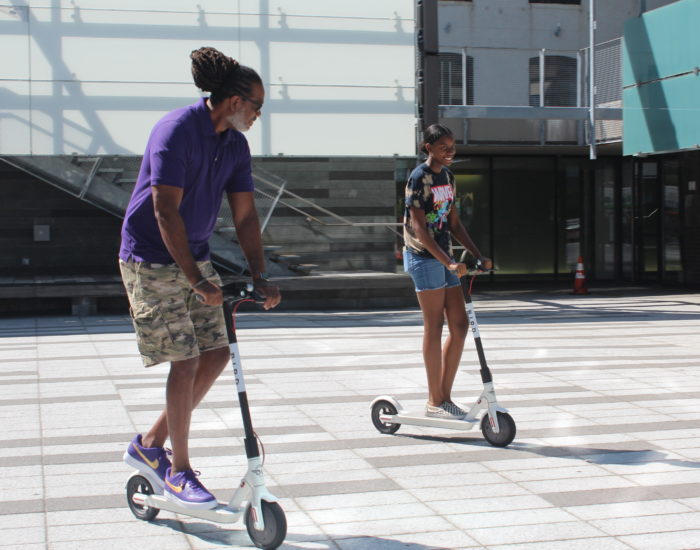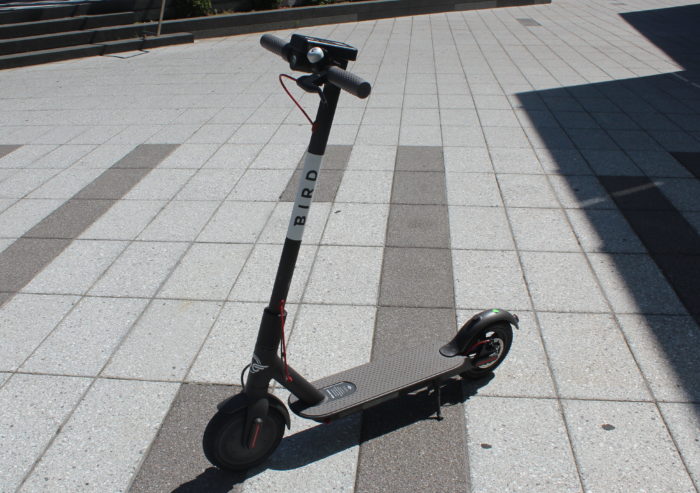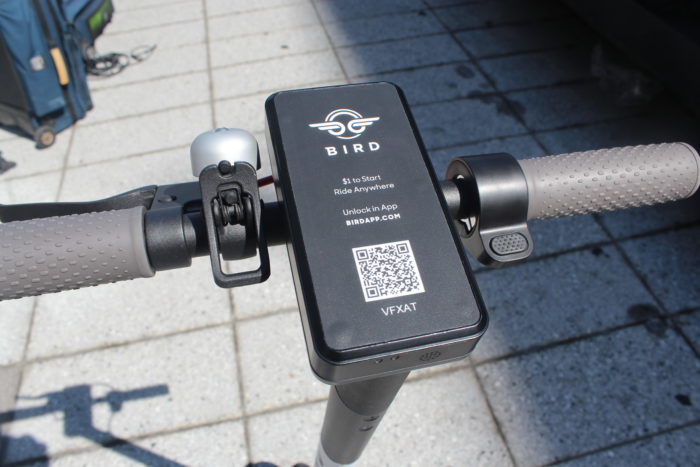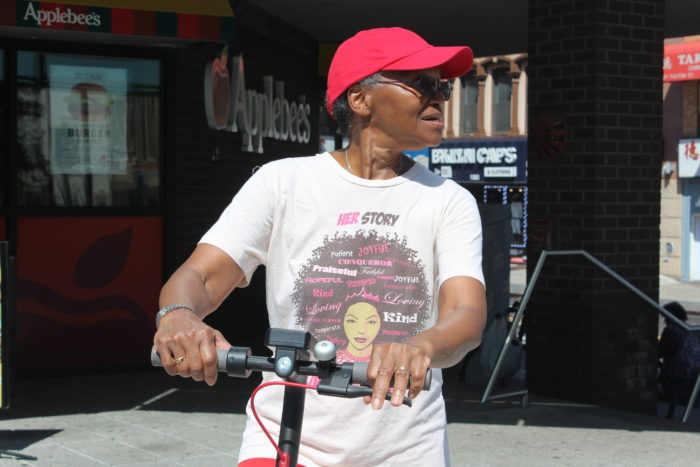Is Brooklyn Ready for the Invasion of the E-scooters?
As billion-dollar startup companies launch fleets in cities around the U.S., New York is the biggest prize of all
City Council Member Robert Cornegy test-riding a Bird scooter this week in Brooklyn with his daughter Nala (Photos by Arden Phillips)
When I first laid eyes on the sleek new Bird scooters, I thought to myself, “Okay, I used to ride a Razor scooter. How much harder could this be?” The short answer to the question is, “It’s harder.” And the longer answer is, “It’s harder, but you get the hang of it pretty quickly.”
Dozens of Brooklynites, including City Council Member Robert Cornegy Jr., tooled around Bedford-Stuyvesant’s Restoration Plaza on Thursday in a test drive of the next big thing in emission-free transportation. The demonstration was provided by Bird, one of several companies that have stormed into the market to provide electric-powered scooters for rent.
While electric scooters are currently illegal in New York City, city officials have been working on legislation to change that, given the shortcomings of mass transit in general and the impending L-train shutdown in particular. Much like shareable bikes and the electric mopeds pioneered by Revel, a company that recently launched in Brooklyn, e-scooters are an app-based service. Riders launch the app, find a scooter nearby, reserve it, and hop on.

Top speed on the scooters is about 15 mph; scooters can travel 20 to 30 miles per battery charge
When riders are done using the scooter, they’re instructed to park them somewhere that doesn’t block a public pathway or near a bike rack, if one is available. Sounds simple enough, but in many cities where the scooters have been introduced, careless parking has created at least a temporary backlash among citizens and elected officials.
In June, e-scooters were abruptly banned in San Francisco after Bird and one of its competitors, Lime, had suddenly flooded the city with hundreds of them only a few months earlier. After pausing to study the situation, this week the city gave two smaller companies, Scoot and Skip, permission to test fleets of 625 scooters each. But both Bird and Lime got a thumbs up the same day in Santa Monica, Calif., where Bird is headquartered, to operate fleets of 750 scooters. Venture capitalists have poured money into e-scooter startups, bringing the valuation of Bird and Lime to more than $1 billion each.
Besides their parking issues, e-scooters will have to overcome concerns about their safety. Bird riders are advised to wear a helmet. (In New York City, helmets are required by law for riders of bicycles and kick scooters if they are under the age of 14.) And while the e-scooters travel at 15 mph or less, the average pedestrian walks at about 3 to 4 mph, meaning that collisions between the two tend to be more likely to injure the pedestrian. In addition to scrapes and bruises, e-scooter related injuries have included concussions and broken arms.

Riders use an app to reserve a scooter and pay for their ride, starting at $1
However, e-scooter advocates point out that the devices help keep bigger, heavier vehicles off the road, even if a rider chooses a scooter instead of a bike. “These devices are lighter, smaller and slower than a bicycle,” Bird’s director of public policy, Matthew Kopko, told The Bridge. “They take up about a third as much space and we think that this is actually going to be an improvement in safety in New York City because we want more people traveling on slower devices, we want more people traveling on lighter and smaller devices.”
At the demo, Council Member Cornegy spoke about the importance of finding a way to integrate the scooters into city life in a way that prioritizes safety. “The test market that we did around Citi Bike as a transportation alternative, it proved to be incredibly positive, and we see no reason that this wouldn’t be, except for the safety issues,” he said. One way is to keep the scooters off the sidewalks, steering them into “designated bike lanes or scooter lanes to make sure that people are safe as they transverse into the street,” he said.
Besides being environmentally friendly, the scooters are affordable. Each ride costs $1, plus 15 cents per minute. For New Yorkers whose daily commutes include “transit gaps,” those couple of extra miles between their home or workplace and the nearest subway or ferry stop, scooters could speed up getting from Point A to Point B.

Among the test drivers this week was Beatrice Jackson, 71, suggesting that e-scooters aren’t just for the young
While e-scooter experiments have been spreading across the U.S., New York City stands as the biggest potential market, given its size and population density. Legislation to alter the city codes so that the devices are legal and regulated is expected to be considered this fall. In an op-ed piece this month, City Council members Rafael Espinal and Ydanis Rodriguez said they plan to introduce such a bill in September, saying they were encouraged by the efforts of e-scooter companies like Bird to encourage proper use.
“To address concerns in other cities, the company made a great decision by starting the Save Our Sidewalks pledge, whereby they pick up every scooter parked on the sidewalk at night, deploy new scooters only when data show increased demand, and contribute at least a dollar per scooter per day to fund transportation infrastructure in each city they operate,” the council members wrote.
The scooters are likely to create their own mini-economy as well. “Behind every scooter,” reported Vox, “is a vast, invisible infrastructure network that keeps the scooters maintained, charged, and accessible.” The battery-powered scooters can travel 20 to 30 miles on a charge. When they’re depleted, freelance workers–Lime calls them “juicers”–can detect their location, take them home, and charge them. Juicers reportedly can earn $9 to $12 per recharge, which uses about five cents’ worth of electricity.
In the end, one of the biggest things that scooters have in their favor is that they’re fun to ride. Once I got the hang of it during the demo, I didn’t want to give my scooter up. While their top speed isn’t that high, they feel faster because they pick up speed rather quickly. Council Member Cornegy rode around the plaza between each interview that he gave during the demo, where riders included a relative of his, 71 year-old Beatrice Jackson. “We had a family member come out,” he said, “who rode and wanted to race me, which I didn’t want to do, because you don’t want to blow out a senior–or lose to a senior in your district,” joked the council member.













